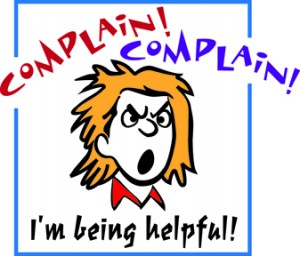 Are you constantly expressing dissatisfaction, discontent, resentment and negativity about life, versus being happy, helpful, and positive about your surroundings? Many people are chronic complainers and don’t even realize it.
Are you constantly expressing dissatisfaction, discontent, resentment and negativity about life, versus being happy, helpful, and positive about your surroundings? Many people are chronic complainers and don’t even realize it.
Your sentiments may be noble in thinking you are only trying to be helpful, to improve situations, or resolve something you think is wrong. Whatever the reason, remember that it’s not what you do, but how you do it that counts. There are better ways to get your point across than being a chronic complainer.
Complaining is a most unhealthy and negative practice. It doesn’t solve anything and is most destructive, mentally and physically, especially when it’s repeated over time. It becomes a part of a brand and culture of a person, family, department, or company. It also becomes a communicable disease if you find yourself engulfed in this practice just to “belong” and be a part of a group and community.
Here are my tips on how to turn it around:
- We often hear people complaining about the weather… it’s too hot, it’s too cold. Why say it in such a way? So what? Instead, let’s just accept it for what it is and be grateful it’s not worse!
- The antonym to complaining is praising. As the old saying goes: If you don’t have something nice to say, don’t say it at all.
- Never share something negative without offering something positive to improve or remedy the matter. This is best achieved by using the Sandwich Technique. Begin with saying something positive before sharing your discontent, then end by offering a suggestion and idea on how to improve or resolve the situation. See our past blog on The Sandwich Technique (also at https://www.advancedetiquette.com/blog/business/the-sandwich-technique-to-deliver-bad-news-or-complaints/)
- In doing research for this Tip, I found a terrific web site called, A Complaint Free World. Wouldn’t that be great? I spent 30 minutes viewing every tab, including its videos about the harmful effects of complaining and what we must all do to stop this terrible habit. The site promotes books, DVDs, and bracelets to help remind us to live a complaint-free life and a fun certificate program for living 21 consecutive days complaint-free. I’m go for it, beginning 15 August… join me!
Here are a few quotes to keep in mind from Will Bowen, founder of A Complaint Free World:
- Our thoughts create our lives and our words indicate what we are thinking.
- Complaining is like bad breath… You don’t always know you have it until someone tells you.
- Physical symptoms are born in our minds.
- Complaining is damaging on everything in our lives. We focus on the program and don’t find the solutions. (The program being the complaint)
Bottom-line: We must all stop complaining. It is truly a most negative and non-productive activity. Rather, we must amend the way we speak to be positive and productive at all times. This will truly make for a happier and healthier life.
Question: What do you think about this article? Share your comments.
Happy Practicing!

This was a great article. I will keep this in mind before I open my mouth when I am in a meeting.
Ayisha: Thank you for the post. Yes, thinking twice is what it’s all about. We must always think about how we will say something that will be perceived as positive versus negative.
A viewer sent this via email: Be positive and constructive in your criticism to raise your credibility, instead of lowering it with negativity. “Any fool can criticize, condemn and complain and most fools do.” – Benjamin Franklin
“Be careful of your thoughts, for your thoughts become your words.
Be careful of your words, for your words become your actions.
Be careful of your actions, for your actions become your habits.
Be careful of your habits, for your habits become your character.
Be careful of your character, for your character becomes your destiny.”
Bottom line, always start with thinking good positive thoughts!
Wonderful post. How do you handle a chronic complainer on a BOD who takes pride in his “insightful advice, ” or rather, continuous complaints on every subject, whether in a board meeting, or one-on-one with someone outside of a meeting?